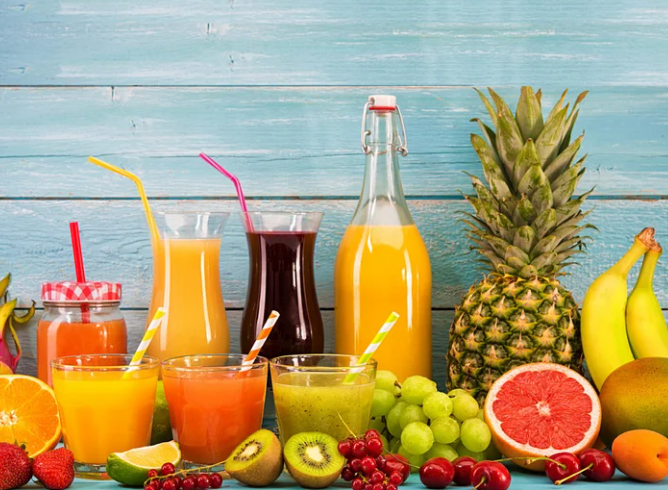What to Eat and Drink
The Search is Over! We Found the Holy Grail of Healthy Juices
In a world inundated with beverage options, the quest for the healthiest choice often leads to the realm of healthy juices. However, navigating through the plethora of options can be overwhelming. Are all juices created equal? What factors distinguish one juice as healthier than another?
In this article, we embark on a journey to unravel the mystery of the healthiest juice to drink. By delving into nutritional content, potential benefits, and considerations such as sugar content and processing methods, we aim to provide clarity and guidance for those seeking to make informed decisions about their juice consumption. Whether you’re looking to boost your immune system, enhance hydration, or simply enjoy a refreshing beverage, understanding the nuances of various juices is essential for promoting overall well-being. Join us as we explore the world of juices and uncover the ultimate choice for nourishment and vitality.
Nutritional Profile of Juices

When deciding on the healthiest juice to drink, it’s crucial to evaluate the nutritional value of each option. Here are some important things to bear in mind:
Understanding Sugar and Fiber Content
One of the most significant factors to consider when selecting a juice is its sugar content. While natural sugars in fruits aren’t always unhealthy for you, it’s vital to limit additional sugars. Many juices on the market include added sugars, which can lead to weight gain and other health problems.
It’s also vital to consider a juice’s fiber level. Fiber is vital for digestive health and can help you feel fuller and pleased. However, many juices lose their fiber during processing, so choose alternatives that are little processed or contain extra fiber.
Vitamins and Minerals in Juices
Juices are an excellent source of vitamins and minerals, including vitamin C, potassium, and calcium. Vitamin C is a powerful antioxidant that improves immune function and protects against disease. Potassium is necessary for proper blood pressure and cardiac function. Calcium is essential for healthy bones and teeth.
When selecting a juice, seek alternatives rich in these essential nutrients. However, bear in mind that many juices are fortified with vitamins and minerals, so read the labels carefully to verify you’re getting the real thing.
Antioxidants and Their Role
Finally, examine a juice’s antioxidant content. Antioxidants help to prevent cell damage and can lower the risk of chronic diseases such as cancer and heart disease. Healthy juices contain a variety of antioxidants, including vitamins C and E, flavonoids, and carotenoids.
When selecting a juice, seek alternatives rich in these important antioxidants. However, keep in mind that many drinks are promoted as “antioxidant-rich” despite containing only trace levels of these essential chemicals. Always read labels carefully and conduct research to ensure you’re getting the best value for your money.

Health Benefits of Different Juices
Vegetable Juices and Their Advantages
Vegetable juices are a great source of nutrients and can give numerous health advantages. Beet juice, for example, is one of the healthy juices that can help decrease blood pressure and boost athletic performance. Tomato juice contains lycopene, which has been associated to a lower risk of heart disease and certain types of cancer. Drinking vegetable juices can also help reduce inflammation, which is a contributing cause of many chronic conditions.
Fruit Juices and Chronic Disease Prevention
Fruit juices are an excellent source of nutrients and can give numerous health advantages. Pomegranate juice, for example, contains significant levels of antioxidants and has been demonstrated to increase blood flow and reduce inflammation. Cranberry juice has been associated with a lower incidence of urinary tract infections, but blueberry juice has been found to boost cognitive performance. Fruit juices can also help prevent chronic diseases including heart disease, diabetes, and obesity by supplying important nutrients and antioxidants.
Overall, vegetable and fruit juices can give numerous health benefits when drunk as part of a well-balanced diet. It is crucial to remember, however, that juices should not be used as a sole source of nutrition and should be eaten in moderation due to their high sugar content.

Choosing the Healthiest Juices
When it comes to picking the healthiest juice, there are a few things to consider. Reading labels for added sugars and preservatives is critical, as is exploring organic and cold-pressed options.
Reading Labels for Added Sugars and Preservatives
Many juices on the market contain additional sugars and preservatives, which might neutralize any health benefits. When reading labels, search for healthy juices that are 100% fruit juice and have no added sugars or preservatives. It’s also vital to consider serving sizes, as some bottles may include multiple portions.
The Importance of Organic and Cold-Pressed Options
Organic juices are created from fruits that have not been treated with synthetic pesticides, which can be damaging to the environment and human health. Cold-pressed juices are created with a hydraulic press that extracts juice from fruits and vegetables without exposing them to heat or air. This method preserves more of the nutrients and enzymes found in fruits and vegetables, making them a better choice.
When selecting cold-pressed juices, search for those that are 100% juice, with no added sugars or preservatives. It’s also a good idea to select juices produced from a variety of fruits and vegetables since this can assist in guaranteeing that you’re getting a diverse range of nutrients.
Overall, the healthiest juices are created from 100% fruit juice and have no added sugars or preservatives. Organic and cold-pressed choices can also be beneficial because they are frequently created with higher-quality ingredients and retain more of the nutrients present in fruits and vegetables.

Incorporating Juice into a Healthy Diet
Juices can be an excellent method to add key nutrients to a healthy diet. However, juices should not be used to substitute complete fruits and vegetables in the diet. Here are some recommendations for including juice in a healthy diet:
Balancing Juice with Whole Fruits and Vegetables
While juices are a convenient method to receive nutrients, it’s crucial to supplement them with entire fruits and vegetables. Whole fruits and vegetables provide dietary fiber, which is essential for good digestion and blood sugar regulation. Juices, on the other hand, are often poor in fiber and can cause blood sugar levels to rise.
To balance juice with entire fruits and veggies, it is recommended that you drink at least 2-3 servings of whole fruits and vegetables each day, in addition to any juices. This can be accomplished by including fruits and vegetables in meals, snacking on them throughout the day, or putting them into juice preparations.
Moderation and Dietary Considerations
Juices can be a healthy supplement to a balanced diet, but they should be used in moderation. Juices are generally strong in natural sugars, which can lead to weight gain if drunk in excess.
Individuals with dietary concerns, such as diabetes or excessive blood sugar, should exercise caution when drinking juice. Choose juices with low natural sugars and high dietary fiber. It is also necessary to monitor blood sugar levels when drinking juices to ensure that they do not cause spikes.
Overall, adding juice to a healthy diet can give important nutrients and significant health advantages. Individuals can enjoy the goodness of nature while maintaining their overall health by balancing juice with whole fruits and vegetables, enjoying them in moderation, and taking dietary issues into account.
Conclusion
In conclusion, determining the healthiest juice to drink involves considering a multitude of factors, including nutritional content, potential benefits, and processing methods. While each type of juice offers its unique set of nutrients and advantages, there is no one-size-fits-all answer. Instead, individuals should prioritize whole fruits and vegetables over processed juices, opt for varieties with minimal added sugars or artificial ingredients, and consider their own dietary needs and preferences.
By making mindful choices and incorporating a diverse array of healthy juices into a balanced diet, individuals can enjoy the benefits of these beverages while supporting their overall health and well-being. Ultimately, the healthiest juice is one that aligns with individual health goals and contributes to a holistic approach to nutrition and wellness. Cheers to making informed choices and embracing the delicious diversity of nature’s bounty!
Trusted Health, Wellness, and Medical advice for your well-being



